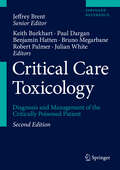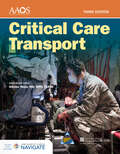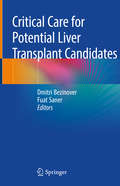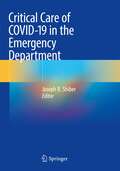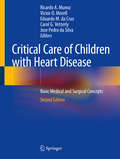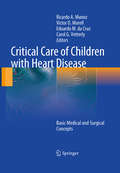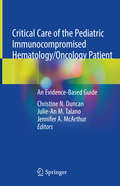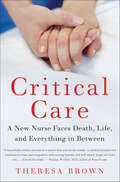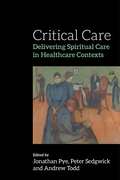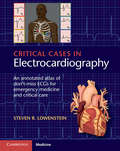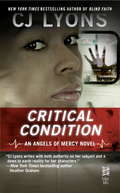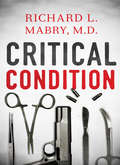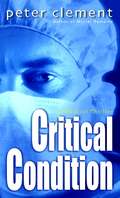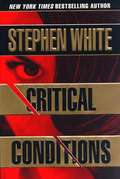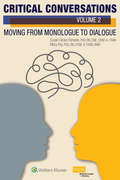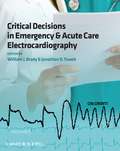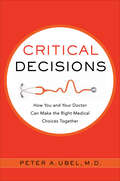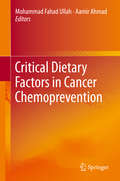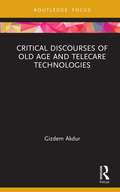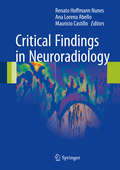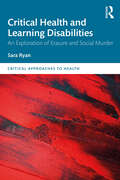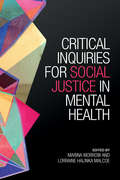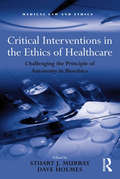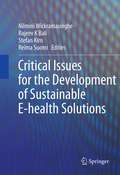- Table View
- List View
Critical Care Toxicology: Diagnosis and Management of the Critically Poisoned Patient (Medical Reference Ser.)
by Robert Palmer Jeffrey Brent Keith Burkhart Paul Dargan Benjamin Hatten Bruno Megarbane Julian WhiteNumerous references describe the initial treatment of the acutely poisoned patient; however, this new book is the first major critical care toxicology resource that details patient care from hospital admission and treatment all the way through stabilization, monitoring, and discharge. It presents practical, state-of-the-art treatment recommendations based on initial and subsequent presentation of symptoms, and describes when it's safe to discharge the patient. Individual sections comprehensively cover general management of the critically poisoned patient #65533; toxic syndromes #65533; poisoning by medications #65533; drugs of abuse #65533; chemical agents #65533; biological toxins #65533; agents of chemical and biological terrorism #65533; and antidotes. Each chapter features the guidance of medical toxicologists who have particular expertise in the area discussed. LI>Coverage includes discussions of the specific clinical concerns involved in treating poisoned pediatric, pregnant, and geriatric patients, as well as general psychiatric issues relevant to the critically poisoned patient.
Critical Care Transport
by American Academy of Orthopaedic Surgeons (AAOS) American College of Emergency Physicians (ACEP) UMBC,
Critical Care for Potential Liver Transplant Candidates
by Dmitri Bezinover Fuat SanerThis book focuses on patients with end-stage-liver disease (ESLD) who could possibly qualify for liver transplant. This patient cohort raises many problems: who should be treated and also, when is it too late for transplant? The authors are all dedicated experts in the field of ESLD/liver transplantation, but from different disciplines with different views of the problem. <P><P> In the past 15 years many things have changed in the treatment for these patients: cardiac assessment, treatment of porto-pulmonary hypertension, hemodynamics, coagulation assessment and management, diagnosis of kidney failure, and the timing of dialysis. These issues are comprehensively discussed in this book, in order to provide physicians starting in the field of transplantation an overview of different areas of concern. <P><P> This book is aimed at specialists and trainees in critical care, hepatology, anesthesia, surgery, and nephrology.
Critical Care of COVID-19 in the Emergency Department
by Joseph R. ShiberThis book functions as a comprehensive manual for emergency care providers who are treating critically ill COVID-19 patients. Beginning with an overview of the COVID-19 infection and an examination of the patients who received critical care from hospital emergency departments around the country, this book provides clinicians with a guide to best-practices in everything from personal protection while deploying critical care to COVID-19 patients to evaluation and diagnosis of the illness. Subsequent chapters break down care of various comorbidities seen in COVID-19 patients and the care offered to patients suffering from the illness in a multitude of ways. Closing chapters examine how emergency departments can best prepare for potential surges in COVID-19 patients as the illness continues to develop, providing important information on how to best protect hospital employees and best care for future patients in a constantly shifting landscape.Due to the rapid onset of the illness and strong-hold the pandemic had on the lives and careers of healthcare professionals, Critical Care of COVID-19 in the Emergency Department fills a critical gap in the literature available on this topic.
Critical Care of Children with Heart Disease: Basic Medical and Surgical Concepts
by Carol G. Vetterly Victor O. Morell Ricardo A. Munoz Eduardo M. da Cruz Jose Pedro da SilvaThis extensively revised new edition comprehensively reviews the medical and surgical management of the acutely-ill child with congenital and acquired cardiac disease. It enables the reader to gain a thorough understanding of basic and practical concepts of anatomy, pathophysiology, surgical techniques and peri-operative management in this group of patients. Extensively revised chapters cover the management of cardiac patients on extracorporeal membrane oxygenation, hemofiltration, and plasma exchange. New topics covered include the use of pharmaceuticals in cardiac intensive care, the implications of interventional cardiology in pediatric intensive care and ventricular assist devices. Practically relevant guidelines are also included for cardiovascular nurses. Critical Care of Children with Heart Disease presents a thorough review of the practical concepts, available treatment techniques, and the challenges associated with managing these patients in the critical care unit. It represents a timely and valuable textbook reference for students and practising healthcare professionals alike seeking to learn or further their understanding of the latest advances in this discipline.
Critical Care of Children with Heart Disease: Basic Medical and Surgical Concepts
by Ricardo Munoz Victor Morell Eduardo Da Cruz Carol VetterlyCritical Care of Children with Heart Disease will summarize the comprehensive medical and surgical management of the acutely-ill patient with congenital and acquired cardiac disease. The aim of the book is to teach bedside physicians, nurses and other caregivers, basic and practical concepts of anatomy, pathophysiology, surgical techniques and peri-operative management of critically ill children and adults with congenital heart disease, allowing these professionals to anticipate, prevent or else treat such pathologies. The book will cover specific cardiac lesions, review their anatomy, pathophysiology, current preoperative, intraoperative and postoperative assessment and management; medical and surgical complications will be briefly described with each lesion further discussed in specific chapters. In addition, the book will have dedicated chapters to management of cardiac patients on extracorporeal membrane oxygenation, hemofiltration, hemo or peritoneal dialysis and plasma exchange. Practical guidelines for cardiovascular nursing care will be also included.
Critical Care of the Pediatric Immunocompromised Hematology/Oncology Patient: An Evidence-Based Guide
by Christine N. Duncan Julie-An M. Talano Jennifer A. McArthur<p>This volume provides a comprehensive overview of critical care of the pediatric immunocompromised hematology-oncology patient. The text focuses on unique aspects of the pediatric immunocompromised patient that predisposes the child to significant illness, and presents critical care management strategies specific to the patient population. In addition to chapters on oncology, primary immune deficiency, immunocompromised hematology, and hematopoietic cell transplant patients, the book covers the changing landscape of ICU care, pharmacologic considerations, and psychological and social aspects of the critical care of hematology-oncology patients. <p>Written by experts from a range of disciplines, Critical Care of the Pediatric Immunocompromised Hematology/Oncology Patient: An Evidence-Based Guide is a valuable resource for clinicians and practitioners who treat this patient population.</p>
Critical Care of the Stroke Patient
by Stefan Schwab Daniel Hanley A. David Mendelow Stefan Schwab Daniel HanleyNew and groundbreaking therapeutic options for the critical care of patients with cerebrovascular disease have improved patient management, minimized morbidity, reduced in-patient care, improved quality of life, and had a positive economic impact on health service provision. This volume integrates these approaches and suggests the best therapy option for all cerebrovascular conditions. The early chapters of the book focus on monitoring techniques and interventions. Subsequent sections address the critical care of a wide range of cerebrovascular diseases: ischemic stroke, intracranial hemorrhage, subarachnoid hemorrhage, arteriovenous malformations, cerebral venous thrombosis and traumatic injury. The editors and authors are internationally recognized experts in their field, and the text is supplemented by tables and illustrations to demonstrate important clinical findings. This book will meet the needs of stroke physicians, neurologists, neurosurgeons, neurointensivists and interventional neuroradiologists seeking to maximize positive outcomes for their patients.
Critical Care: A New Nurse Faces Death, Life, and Everything in Between
by Theresa Brown“Among all the recent books on medicine, Critical Care stands alone.“ — Pauline Chen, author of Final Exam“A must read for anyone who wants to understand healthcare. Extraordinary.” — Elizabeth Cohen, MPH, CNN Senior Medical Correspondent Critical Care is the powerful and absorbing memoir of Theresa Brown—a regular contributor to the New York Times blog “Well”—about her experiences during the first year on the job as an oncology nurse; in the process, Brown sheds brilliant light on issues of mortality and meaning in our lives.
Critical Care: Delivering Spiritual Care in Healthcare Contexts
by Debbie Hodge Peter Sedgwick Steve Nolan Jonathan Pye Julian Raffay Karen Mackinnon Layla Welford Charles Thody Hamish Ferguson-Stuart Stephen Flatt Anne Mccormick Rodney Baxendale Mirabai Galashan Mark Clayton Andrew Todd Richard WhartonProviding a bridge between research in healthcare and spirituality and practitioner perspectives, these essays on chaplaincy in healthcare continue dialogue around constructing, negotiating and researching spiritual care and discuss the critical issues in chaplaincy work, including assisted suicide and care in children's hospices. Each section of the book is introduced by an academic theologian, giving the book a strong theoretical base, before serving healthcare chaplains offer their perspectives and experiences with material drawn from practice in a broad spectrum of healthcare contexts. The integration of theory and practical application in these essays will be of interest to chaplains, healthcare practitioners, and students of theology and healthcare.
Critical Cases in Electrocardiography: An Annotated Atlas Of Don't-miss Ecgs For Emergency And Critical Care
by Steven R. LowensteinEmergency and critical care providers are often challenged by patients with acute cardiorespiratory symptoms and abnormal electrocardiograms. <P><P>Critical Cases in Electrocardiography emphasizes clinically-relevant topics, focusing squarely on situations where interpretation of the ECG contributes to clinical decision-making. <P>This atlas is unique, in that it includes numerous examples of ECG 'misses' - cases where the computer algorithm or the clinicians (or both) got the diagnosis wrong. While many textbooks include only smaller, black and white ECG tracings, which do not resemble actual clinical practice, this volume is designed to encourage self-study of the ECG by including full-page tracings in their natural color. The book focuses on 'don't miss' ECG tracings in order to help readers advance beyond the stage of 'competent' electrocardiographer. Anatomic and electrophysiologic correlations are emphasized throughout the work, helping readers appreciate the anatomic and electrical origins of the ECG abnormalities, rather than relying solely on pattern memorization.<P> The atlas format encourages quick review of clinical cases, focusing on the ECG tracings.<P> Includes real-life examples of 'easy-to-miss' presentations of common emergencies, teaching advanced readers to diagnose critical emergencies.<P> Anatomic and electrophysiologic correlations are emphasized throughout, helping readers appreciate the anatomic and electrical origins of the ECG abnormalities rather than relying solely on pattern memorization.
Critical Condition
by C. J. LyonsIn the fourth Angels of Mercy novel, New York Times bestselling author CJ Lyons returns to an ER under attack as the lives of four very special women hang in the balance... With Pittsburgh snarled by a New Year's Eve blizzard and Angels of Mercy Hospital cut off from the outside, staff and patients are at the mercy of armed gunmen. Their target is Dr. Gina Freeman, who is holding vigil over her wounded fiancé, Detective Jerry Boyle. Trapped inside with her are ER charge nurse Nora Halloran and fourth-year medical student Amanda Mason, on the last night of her rotation--if not her life. Stranded outside the hospital walls is ER physician Lydia Fiore, whose past holds the secret the hitmen are willing to kill for. With patients, staff, and loved ones held as hostages, the power out, and cold-blooded killers in control, no one may live to see the New Year... Critical Condition includes a teaser for the first Angels of Mercy novel, Lifelines.
Critical Condition
by Richard L. MabryIT WASSUPPOSED TO BE A QUIET DINNER PARTY WITH HER COLLEAGUES--NOT THESCENE OF A MURDER.But the murder of a stranger on herfront lawn is only the first in a string of events that have Dr. ShannonFrasier's life teetering on the edge of chaos. She's unable to make the deepercommitment her boyfriend deserves. Her sister shows up at her home needing aplace to stay but with no promise she'll remain sober. And her father isdiagnosed with cancer. Then Shannon's life stops teeteringand plunges into the abyss. Because the person behind the guttural voice on thephone wants to know what the stranger said before he died. And he won't stopuntil Shannon gives him the information he wants--even if she doesn't have it.He's coming for her. She's not surethe police on the case can be trusted. And her only hope of escape--for herselfand for those she loves--is to overcome her buried past.
Critical Condition (Dr Richard Steele #2)
by Peter ClementIn the heat of a passionate encounter, ecstasy suddenly turns to terror for renowned geneticist and TV personality Dr. Kathleen Sullivan. Stricken by a brain hemorrhage, she is rendered completely paralyzed and speechless . . . but still utterly aware; a prisoner inside her own body.Kathleen is rushed to a Manhattan hospital, her chances of survival slim. Even if she pulls through, the likelihood that she’ll sustain permanent brain damage is near one hundred percent. But neither outcome can compare to the insidious fate in store for her masterminded by the very people entrusted with saving her life. As her lover, ER chief Richard Steele, watches and waits for a miracle, Kathleen becomes a pawn in a clandestine plot that runs deeper than medical politics–and reaches into the highest echelons of power at New York City Hospital. Placed in the hands, and at the mercy, of revered Chief of Neurosurgery Dr. Tony Hamlin, Kathleen descends into a waking nightmare. Powerless to resist the sinister experiments she is subjected to, and unable to cry out for help, she must fight desperately to communicate her tortured, trapped thoughts to Steele–before her tormentors can carry their bizarre and potentially lethal work to its completion. Ruthlessly determined to achieve their goals, the secret cabal of ambitious physicians will go to any length to avoid discovery, defy the law, and make medical history at all costs . . . even the human life they are sworn to preserve.For anyone who has ever had a mortal fear of hospitals, and the sense of powerlessness that often transpires within their cold, sterile corridors, Peter Clement’s Critical Condition will provide chilling new nightmares–along with infectious suspense.
Critical Conditions (Alan Gregory Series #6)
by Stephen WhiteOnce she launched jump shots and dreamed of her first date. Now she lies in a hospital bed, a beautiful girl on the verge of womanhood with enough drugs in her system to kill her. And Alan Gregory, a clinical psychologist who has seen the heights of hurrtan consciousness and the depths of human despair, sits beside her, even though she will not talk, holding her listless hand and wondering what went wrong-and why... In his new Alan Gregory novel, New York Times bestselling author Stephen White gives us his most electrifying and timely drama to date. Blending a riveting plot with acute insight and issues of national importance, Critical Conditions takes us on a spellbinding journey through a labyrinth of deception and murder-into a family's tragedy and one man's struggle to understand. Alan Gregory is called to the ICU before anyone knows the patient's name or what dark demons drove her to attempt suicide. But fifteen-year-old Merritt Strait is no ordinary depressed teenager. The daughter of a hard charging investigative reporter and a psychologist, she is also the stepsister of a little girl at the heart of a medical tragedy in the making. While Merritt clings to life in her hospital room, Chaney Strait lies near death in another hospital with an infection that is slowly destroying her heart.: Denied an experimental new treatment that could save her life by the Straits' managed-care provider, Chaney has become a symbol of a health care system driven by costs, not care. And Alan believes that somewhere along the way, Merritt has gotten lost in all the media attention surrounding her younger sibling. But as Merritt begins to recover, yet still refuses to speak, Alan suspects that something else may lie behind her suicide attempt. Then a wealthy executive of one of the family's is found dead ... and Alan and Denver detective Sam Purdy uncover shocking evidence that links Merritt to his death. With his wife, Boulder County DA Lauren Crowder, away helping her ailing mother at the risk of her own fragile health, Alan must sort through the most complex and elusive case of his career, along with his own feelings of loneliness, anger, and helplessness. More blood will be spilled and more lives destroyed before he uncovers a shattering truth about greed and callousness that kill, and how far people will go in the name of revenge ... and love.
Critical Conversations, Volume 2: Moving From Monologue to Dialogue
by Susan Forneris Mary FeyCritical Conversations, Volume 2: Moving From Monologue to Dialogue With the field of nursing in the midst of an unprecedented transformation, nurse educators seek new approaches to classroom teaching and learning that prepare students to confront the complexities of practice and confidently solve problems in clinical settings. Building on the foundation of Critical Conversations: The NLN Guide for Teaching Thinking, this second volume in the NLN’s Critical Conversations series delivers specific examples and expert direction — grounded in knowledge from learning science and models of experiential, situated, and constructivist learning — that nurse educators can use to engage students in active thinking as they work together to determine the best approaches to clinical situations. Structured around the “three Cs” of context, content, and course, this approachable text enhances the teacher-learner relationship and emphasizes clinically focused, authentic dialogue to help nurse educators provide the realistic problem-solving experiences essential for preparing tomorrow’s nurses for practice. “The value of this second volume in the NLN’s Critical Conversations series is in the specific guidance it offers to nurse educators. Based on evidence from learning science, constructivist and experiential learning theories, and the science and philosophy of situated cognition, the authors use examples and offer specific instructions to assist nurse educators in all settings to develop the skills they need to transform their teaching and maximize learning.” Lisa Day, PhD, RN, CNE, ANEF, FAAN Associate Dean for Academic Affairs and Clinical Professor Washington State University College of Nursing
Critical Decisions in Emergency and Acute Care Electrocardiography
by William J. Brady Jonathon D. TruwitThis scenario-based text provides answers to urgent and emergent questions in acute, emergency, and critical care situations focusing on the electrocardiogram in patient care management. The text is arranged in traditional topics areas such as ACS, dysrhythmia, etc yet each chapter is essentially a question with several cases illustrating the clinical dilemma - the chapter itself is a specific answer to the question.This is a unique format among textbooks with an ECG focus. The clinical scenarios cover the issues involved in detecting and managing major cardiovascular conditions. Focused, structured discussion then solves these problems in a clinically relevant, rapid, and easy to read fashion.This novel approach to ECG instruction is ideal for practicing critical care and emergency physicians, specialist nurses, cardiologists, as well as students and trainees with a special interest in the ECG.
Critical Decisions: How You and Your Doctor Can Make the Right Medical Choices Together
by Peter A. UbelWe've all been there, sittinguncomfortably in a paper gownas a doctor impassively describesour prognosis. Sometimes it's simple andtreatable. Other times we get news wecan't fathom and then are faced withdecisions that are literally life and death.In this revolutionary book, physician,behavioral scientist, and bioethicist PeterUbel, M.D., reveals how hidden dynamicsin the doctor/patient relationship keepus and our loved ones from making thebest medical choices. From doctors whostruggle to explain, to patients who failto properly listen, countless factors alterthe course of our care, causing things togo seriously awry.With riveting stories of Ubel's own experiencein the field, his groundbreakingresearch, and his personal journey walkingloved ones through difficult treatmentchoices, Critical Decisions will foreverchange the way we communicate insidehospitals and medical offices, wherethoughtful decision making matters themost. Dr. Ubel has been on both endsof the stethoscope, and in this book,he shows how patients and doctorscan learn to become partners and worktogether to make the right choices. Fromchoosing to get surgery, to discussingthe side effects of a blood pressure medication,we can finally discover the toolsto improve communication, understandthe issues, and make confident decisionsfor our future health and happiness.
Critical Dietary Factors in Cancer Chemoprevention
by Aamir Ahmad Mohammad Fahad UllahThis book focuses on the prophylactic potential of diet-derived factors in primary prevention of cancer. It is written by a group of highly reputed experts in the area of dietary agents and cancer chemoprevention. The translational potential of dietary factors from epidemiological, laboratory and clinical studies as prevention strategy in normal and risk populations is highlighted. The work presents options of routine inclusion of specific dietary regimens for prevention as well as therapeutic strategy for better management through adjuvant interventions in cancer treatment.
Critical Discourses of Old Age and Telecare Technologies
by Gizdem AkdurThis book makes an enquiry into policies surrounding old age and telecare. It contextualises telecare within the wider history of health and social care in England to build the case that there are grand narratives of old age embedded in policies. Divided into four sections, the book covers: • Connecting old age with telecare • A general review of old age and telecare • A critical enquiry into discourses and the identity of old age • Conclusions and future directions. The author highlights the manifestation of old age discourses in care policies, how they have been perpetuated yet also transformed in the context of telecare, and what this means about older people. The book will be of interest to students and academics in the fields of gerontology, sociology, old age studies, philosophy, social policy, health and social care policy, information systems, and critical theoreticians
Critical Findings in Neuroradiology
by Mauricio Castillo Renato Hoffmann Nunes Ana Lorena AbelloThis book provides clear guidance as to which neuroradiological findings in ill or injured patients should be immediately communicated by radiologists and trainees to the emergency room and referring physicians in order to facilitate key decisions and eliminate preventable errors. It offers a practical and illustrative approach that identifies what to look for and how to report it and describes the required follow-up and the most common differential diagnoses of the main critical findings in neuroradiology. The book is distinctive in being written from a "critical findings perspective", which makes its content more practical and memorable than that of a standard Emergency Neuroradiology textbook. It also illustrates the value of developing algorithmic approaches to report and communicate critical findings based on lists. While the book will appeal to a broad and variable audience, it is especially addressed to radiology training programs and will be a "must read" for residents and fellows in training.
Critical Health and Learning Disabilities: An Exploration of Erasure and Social Murder (Critical Approaches to Health)
by Sara RyanThis empirically grounded book presents a critical, interdisciplinary perspective on social and cultural issues related to the health and wellbeing of people with learning disabilities. Through an exploration of healthcare, love and intimacy, pregnancy and childbirth, housing, employment and food the book highlights the enduringly impoverished lives and premature deaths people labelled with learning disabilities experience globally and suggests that such structural violence amounts to social murder.Through the lens of critical disability studies, the book links the debates around learning disabilities to the larger framework of deinstitutionalisation. It takes a closer look at the label “learning disability”, which remains associated with stigma and shame, and advances comprehension of how and why it is that the lives of this group of people are systematically constrained and shortened. The book further identifies recommendations that can be utilised for challenging and changing these circumstances.It is essential reading for those involved in social and cultural issues related to the lives of people with learning disabilities, and also beneficial for advanced students in sociology, anthropology, psychology, allied health sciences and other related disciplines. It will also be valuable for researchers and health and social care professionals seeking critical insights about their work.
Critical Inquiries for Social Justice in Mental Health
by Marina Morrow Lorraine MalcoeAn exceptional showcase of interdisciplinary research, Critical Inquiries for Social Justice in Mental Health presents various critical theories, methodologies, and methods for transforming mental health research and fostering socially-just mental health practices. Marina Morrow and Lorraine Halinka Malcoe have assembled an array of international scholars, activists, and practitioners whose work exposes and disrupts the dominant neoliberal and individualist practices found in contemporary mental research, policy, and practice. The contributors employ a variety of methodologies including intersectional, decolonizing, indigenous, feminist, post-structural, transgender, queer, and critical realist approaches in order to interrogate the manifestation of power relations in mental health systems and its impact on people with mental distress. Additionally, the contributors enable the reader to reimagine systems and supports designed from the bottom up, in which the people most affected have decision-making authority over their formations. Critical Inquiries for Social Justice in Mental Health demonstrates why and how theory matters for knowledge production, policy, and practice in mental health, and it creates new imaginings of decolonized and democratized mental health systems, of abundant community-centred supports, and of a world where human differences are affirmed.
Critical Interventions in the Ethics of Healthcare: Challenging the Principle of Autonomy in Bioethics (Medical Law And Ethics Ser.)
by Dave HolmesCritical Interventions in the Ethics of Healthcare argues that traditional modes of bioethics are proving incommensurable with burgeoning biotechnologies and consequently, emerging subjectivities. Drawn from diverse disciplines, this volume works toward a new mode of discourse in bioethics, offering a critique of the current norms and constraints under which Western healthcare operates. The contributions imagine new, less paternalistic, terms by which bioethics might proceed - terms that do not resort to exclusively Western models of liberal humanism or to the logic of neoliberal economies. It is argued that in this way, we can begin to develop an ethical vocabulary that does justice to the challenges of our age. Bringing together theorists, practitioners and clinicians to present a wide variety of related disciplinary concerns and perspectives on bioethics, this volume challenges the underlying assumptions that continue to hold sway in the ethics of medicine and health sciences.
Critical Issues for the Development of Sustainable E-health Solutions (Healthcare Delivery in the Information Age)
by Nilmini Wickramasinghe Rajeev Bali Reima Suomi Stefan KirnPervasive healthcare is an emerging research discipline, focusing on the development and application of pervasive and ubiquitous computing technology for healthcare and wellness. Pervasive healthcare seeks to respond to a variety of pressures on healthcare systems, including the increased incidence of life-style related and chronic diseases, emerging consumerism in healthcare, need for empowering patients and relatives for self-care and management of their health, and need to provide seamless access for healthcare services, independent of time and place. Pervasive healthcare may be defined from two perspectives. First, it is the development and application of pervasive computing (or ubiquitous computing, ambient intelligence) technologies for healthcare, health and wellness management. Second, it seeks to make healthcare available to anyone, anytime, and anywhere by removing locational, time and other restraints while increasing both the coverage and quality of healthcare. This book proposes to define the emerging area of pervasive health and introduce key management principles, most especially knowledge management, its tools, techniques and technologies. In addition, the book takes a socio-technical, patient-centric approach which serves to emphasize the importance of a key triumvirate in healthcare management namely, the focus on people, process and technology. Last but not least the book discusses in detail a specific example of pervasive health, namely the potential use of a wireless technology solution in the monitoring of diabetic patients.
